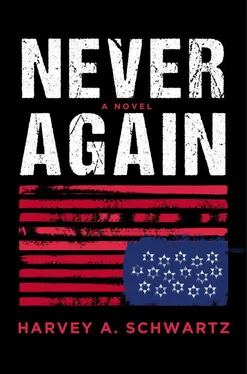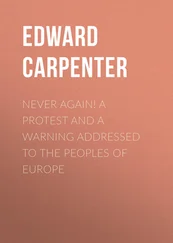“Let them in. These people are different; they are victims of war,” some said. “They are good refugees, not bad ones—not Salvadorians, Nicaraguans, Vietnamese, Cambodians, Mexicans.” “These refugees are Jews, like so many powerful and famous Americans.” “America has always accepted Jewish refugees,” the historically ignorant said.
“They are our brothers, our family,” cried American Jews.
Even former president Donald Trump weighed in, tweeting that the Jews sitting on ships in Boston Harbor should be allowed to join the Great Society because they share America’s Northern European heritage and values. “They look like us, they think like us, they contribute to our society instead of milking it like other groups,” Trump said. Liberals backed by immigrants’rights groups, youth, aging progressives, church groups and some power nonprofits blasted Trump and Jewish sympathizers for their hypocrisy. No special treatment for anybody. “That would be wrong,” they said. Especially wrong for the murderers of Damascus.
So the ships sat in Boston Harbor. Surrounded by America, floating in American water, watching Americans cruise the harbor in their sailboats, watching American airplanes thundering over their heads to land at the nearby American airport, watching American cars drive on American streets. Surrounded by America but not allowed in.
The ebonized cherry table in the conference room at Shapiro, McCarthy and Green felt freshly oiled but of course left no residue on fingers rubbing across its surface. The table, the conference room, the art on the walls and the entire office were on the top floor of a former Howard Johnson’s chocolate warehouse on Boston’s now fashionable waterfront. The conference room was where lawyers from other firms sat during depositions, where they sized up the firm, estimating where their opponents placed in the pecking order of Boston’s legal community. The conference room was where clients were introduced to the firm’s three partners and where fees were first discussed.
The firm’s three partners were Jewish, Irish and black, former assistant district attorneys who had to take second mortgages to meet their first year’s overhead. They had grown the business and now employed eight associates.
The three young men sitting at the conference table across from Ben Shapiro were obviously impressed—and uncomfortable—not knowing what to do with their hands or whether they could put their elbows on the table. They had not spoken except to mumble a barely audible greeting. The middle-aged man with them didn’t share their problems. He sat back. Listened closely to Shapiro.
“Your first problem is a legal doctrine called standing,” Shapiro said, speaking to the older man but occasionally glancing at the three others, noting that every time he looked at them they looked away.
“What this doctrine means is that not just anybody can walk into court and say a government action is unconstitutional. Only people directly affected by a law can challenge it. You can’t challenge a law setting the drinking age at twenty-five if you are thirty years old because that law doesn’t affect you. Before we can challenge what the government is doing, we have to show that somehow, even in a minor way, it affects you.”
“What does that mean?” the older man asked, seemingly annoyed. “Do these boys have to say they are Jewish, or that they lived in Israel, or that they are American citizens? I’ll have them dance the hora in court if you think it would help.”
“No. They are going to have to say, under oath, that they escaped from the ships in the harbor. And then they’ll face the consequences.” Shapiro spoke bluntly, testing to see how serious they were about this lawsuit. “As an officer of the court, I’m not supposed to advise you to break the law, but you do realize, don’t you, that now that you are off the ships, you could disappear into this country, even without legit ID cards.”
“The organization I represent went to considerable effort to surreptitiously remove these men,” the older man said. He pointed at the three young men, who remained silent and seated. “These men are soldiers. Their families were murdered. They came here for sanctuary. They should live with dignity, not hide in the shadows like common criminals. They deserve to be treated with dignity. I want them here legally.”
Shapiro thought a moment. All that the old man said was true, but the case was a loser. No judge would grant asylum in direct defiance of Congress and public opinion. But perhaps the case would garner sympathy and rattle America’s anti-immigrant hysteria.
“This kind of lawsuit can be awfully expensive,” Shapiro said, speaking only to the older man. “We’ll need high-powered experts. They won’t come cheap. Even with them, chances are we’ll lose at the trial level and have to work our way through the appeals courts. You’re probably looking at $400,000 in legal fees and another $40,000 at least, in expenses.”
“It’s not the money that matters,” the older man said. “An important principle is at stake here.”
“The money matters if you don’t have it.”
“Rest assured, counselor, we have it. How much of a retainer do you want?”
“Just to clear up one point. Will you all be parties to the case?” He locked eyes with the older man.
“These men are your clients. I am their, shall we say, benefactor.”
Alone in the conference room after the men left, Shapiro took a deep breath and sat looking out the window at Boston Harbor. He pictured the thousands of frightened people on the two ships.
I guess I took the case , he thought. I don’t expect we’ll win. I wonder what else will have to be done to save these people .
Hinckley Bermuda 40 yawl is the ultimate New England acruising sailboat—the kind of boat that turns heads, the kind pampered by its rich owners. A blue water boat built with a tile fireplace as standard equipment, the Bermuda 40 Swift looked as incongruous tied up stern-first among the fishing boats in the tiny harbor on Xanthos as would a camel in the Alps. The rocky Greek island off the west coast of the Peloponnesus between Greece and Italy saw few yachts, and fewer built by dour Maine boatbuilders as family heirlooms for wealthy Yankees.
Lt. Chaim Levi, former first officer on an Israeli Navy coastal patrol boat, could have cried when he saw the Hinckley’s long, blue hull, the roller furling jib and the stowaway main and mizzen sails, designed so the boat could be sailed singlehanded in the roughest of weather. The boat had been unattended for weeks.
With this boat I could sail anywhere in the world, he thought. With this boat, I could go to America.
Levi’s Israeli Navy patrol boat had spent three days escorting freighters and fishing boats, yachts and ferry boats, anything that could float and could carry people from Haifa Harbor westward into the Mediterranean, getting them away from the coast and the hastily armed fishing boats manned by Palestinians who’d spent three generations trying to force Jews from Israel but were now doing their best to keep any from escaping what they saw as Allah’s punishment.
Finally, out of torpedoes and ammunition for the twin 50-caliber machine guns, with his captain dead from a knife wound to the chest when the boat was boarded at night, Levi knew the remaining fuel was down to a few hours. When his sole crewman spotted a wooden boat powered by two huge outboard engines and crammed with gun-waving men, Levi knew this would be the last engagement for his tired vessel. The Israeli fishing boat he was escorting was loaded with elderly people and children, one of the last boats to escape from Haifa before Lebanese soldiers, Israel’s former Christian allies, roared through the streets looting shops and raping women.
Читать дальше












